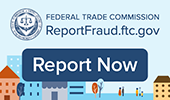Earlier this year, we told you that scammers were lying and saying the FTC is sending people Coronavirus relief money. Now we’re seeing a new version of the phishing email scam that looks like it’s from our Acting Chairwoman, Rebecca Slaughter. The Acting Chairwoman didn’t email you. Scammers who spoofed her email did.
Here are 3 things you need to know about this scam:
- The FTC does not send people Coronavirus relief money. The Treasury Department and the IRS are handling that. Learn more at irs.gov/coronavirus.
- The FTC won’t email, call, text, or message you on social media to ask for your personal information. We won’t ask for your bank account, credit card, or Social Security number; date of birth; address; or phone number.
- Don’t reply to an unexpected email that asks for your personal information. Scammers could use that information to rip you off.
 If you get an email that asks for your personal information and you think it could be a scam, report it to the FTC at ReportFraud.ftc.gov. Your report helps us find and stop scammers. You can also forward phishing emails to the Anti-Phishing Working Group at reportphishing@apwg.org.
If you get an email that asks for your personal information and you think it could be a scam, report it to the FTC at ReportFraud.ftc.gov. Your report helps us find and stop scammers. You can also forward phishing emails to the Anti-Phishing Working Group at reportphishing@apwg.org.
Learn about other Coronavirus scams and what we’re doing to stop them.

In reply to It's scary that the FTC can by GS
In reply to Where can I send info by Ysteb elwof
If you get an email or that asks for your personal information and you think it could be a scam, or want to report other scams, report to the FTC at ReportFraud.ftc.gov.